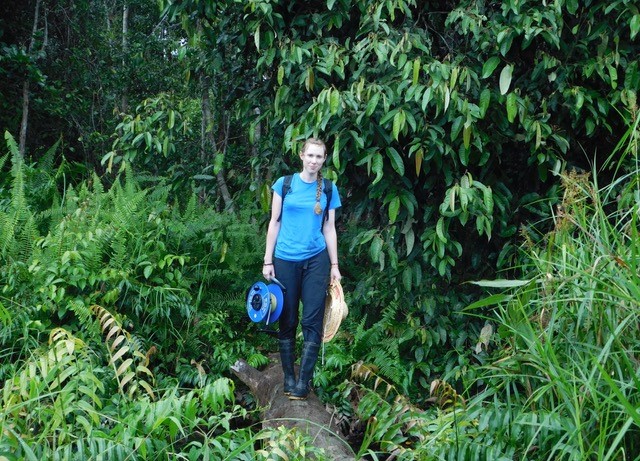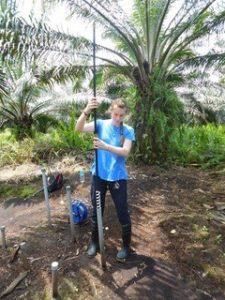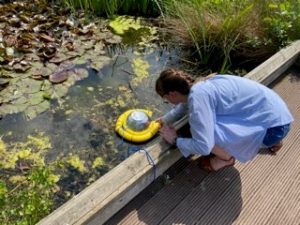
August 25, 2021, by Ruth Musson
Introducing Sarah Cook Assistant Professor Aquatic Science
Sarah Cook was appointed as an Assistant Professor of Aquatic Science in November 2020. Here she tells us a bit about herself and how she came to Nottingham.
The beginning – Peat in Malaysia
My interest in aquatic sciences began when I studied for a PhD in geography at Leicester. I was looking at tropical peat in Borneo in Malaysia – the effects of converting peat swamp forests into oil palm plantations from an aquatic perspective. The peat has to be drained and the peat disappears altogether so basically you lose the land. My role was to look at the amount of carbon that was lost in the waters that were drained. I spent a lot of time in drainage ditches collecting data in the form of water samples. The locals assumed that I was fishing!

Pollution in India
My first post-doctoral researcher post was in engineering at Warwick, looking at pollutant transport in rivers in India. I spent about six weeks doing field work in Mumbai tracing pollution in urban drainage channels. We used dye as a tracer to follow potential pollution downstream. This enabled us to see how the concentration changed and how quickly it got from source to the river. The idea was to look at options for pollution management. Back at Warwick I carried out experiments in flumes which are like a massive fish tank which circulates water around for experiments in flow. This was where I first started to work and developed my interest in micro-plastics. I was also looking at how solute pollution interacts with microorganisms in the sediment bed.
Citizen Science
I started becoming involved in Citizen Science at Warwick. Water quality is one of the major challenges in the world – even in the UK. People don’t realise our individual impact on river – there is a phrase catchment detachment. Basically when we turn on our taps at home we don’t realise where the water comes from, where it goes and the effects that what we put down our drains has on it. I started to develop a tool kit for communities to monitor local environment in India and London. India and the UK have similar water quality challenges. The intention was to provide easily accessible protocols which would create a learning alliance between India and UK. Unfortunately, because of Covid this was not able to continue. I am still passionate about this subject and hope to resurrect something in the future.

Collecting water samples
Nottingham University
I am currently working on a project that is being led by a collaborator in Sweden looking at greenhouse gas emissions from small artificial bodies of water. I have previously done a bit of work on this but this will be a global study collecting water samples from things like drainage ditches, garden ponds etc. We are collecting samples looking at nutrients in the water as well as greenhouse gas emissions such as methane to understand links to water nutrient and carbon storage. These figures are important as they have not yet been included in human emissions figures.
The Future
I am looking forward to working with my PhD student with whom we will be continuing the work on river pollution but this time looking at micro-plastics present in salt marshes in London. The plan is to continue my work looking at garden ponds – maybe expanding into larger bodies of water such as industrial gravel pits. I would also like to link my work in water quality to soil health. There is also a bid for a project with Sacha Mooney for which I am awaiting the outcome. All in all, I am very excited to be working at Nottingham and advancing my studies in these important areas!
Learn more about post graduate research studies in Biosciences here
No comments yet, fill out a comment to be the first

Leave a Reply